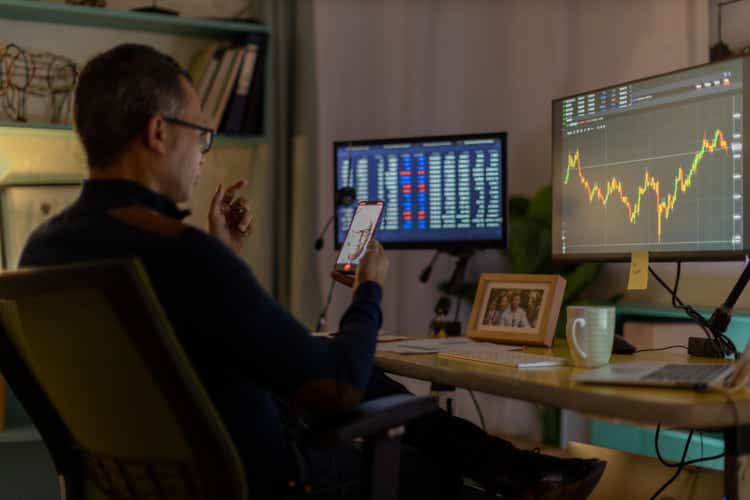Alistair Berg/DigitalVision via Getty Images
By William H. Witherell, Ph.D.
Global equity markets outside of the United States are completing a second negative quarter, with the MSCI ACWI ex US IMI Index down 11.33% in the three months through June 24. For the year to date, this index is down 18.04%, which is short of the bear market definition of a decline of more than 20%. Slowing economic growth in the second quarter, surging inflation that squeezed real incomes and raised prospects for central banks hiking interest rates, disruptions due to the war in Ukraine, and Covid-related shutdowns in China gave plenty of reasons for investors to draw back. The bearish sentiment in equities looks overdone to us, and valuations are becoming attractive. While economic growth prospects for the current year have been scaled back, these reflect the weak first half, which is likely to be followed by a recovery in the second half. Signs that inflation may be peaking contribute to this writer’s guarded optimism.
Looking at the major regions, China and other Asian emerging markets are completing a difficult quarter, with China’s economy probably registering a contraction due to the shutdowns in Shanghai and other cities. An expected strong recovery in the second half, attributable to the lifting of Covid restrictions, increasing policy stimulus, and an easing of regulatory pressures, will be beneficial to the regional and global economies. Our forecast of a global soft landing is centered on a recovery in the world’s second-largest economy and largest exporter. The Chinese equity markets have already begun to recover some of their steep decline earlier in the year; and those of South Korea, Taiwan, Malaysia, India, and Hong Kong also should benefit.
The economies of the advanced economies of Japan and Australia also have been hit by the slowdown in China and will be helped by the expected Chinese recovery. They have been impacted less by the war in Ukraine than has Europe. Japanese equities lost some 15.31% over the past three months as measured by the MSCI Japan Index, while Australian stocks lost 17.41% according to the MSCI Australia IMI Index. Unlike other central banks, the Bank of Japan continues to maintain interest rates close to zero, which is putting continued downward pressure on the yen. Currency depreciation can help exports, but adds to inflation through higher import prices and hurts returns to US-based investors. In Australia, the central bank, in contrast, increased its policy rate by 25 basis points in May and an unexpected 50 basis points in June as it reacted to a stronger outlook for energy prices. Another 50-basis-point increase is expected in July, which could threaten household consumption growth.
The latest high-frequency indicators for the Eurozone, the flash PMIs and consumer confidence surveys, make gloomy reading, as they indicate a sharp drop in growth momentum in June, with manufacturing looking particularly weak. Even services, which started the month getting stronger, have moderated. The Ukraine war is affecting Europe more than other regions, with energy concerns becoming increasingly severe. Consumer and business confidence are also being hit by surging inflation, reducing real incomes and raising the prospect of higher interest rates. Eurozone stocks fell 11.29% in the last three months, bringing them clearly into a bear market for the year to date, with the MSCI EMU Index down 22.93%. Looking ahead, there is great uncertainty, driven by the Ukraine war. Services spending will likely rise sharply, benefiting those economies with the strongest service sectors, while the industrial sector will continue to suffer. This suggests that Southern European economies like Spain may outperform. Italy, however, may not do as well, since it has the second-largest industrial sector in Europe. Overall Eurozone economic growth for the year is likely to be a little less than 3%, compared with 5.4% in 2021.The United Kingdom equity market has outperformed most other markets in the first half, with MSCI United Kingdom Index down 8.42% in the last three months and just 7.35% year to date. This has been achieved despite a decline in the economy in the second quarter. The June S&P/CIPS Flash Composite Output Index was unchanged from its May reading, as resilient service sector activity was offset by weakening manufacturing activity. The UK economy does have the advantage, compared to mainland Europe, of greater flexibility in obtaining energy resources.
Latin America is another region somewhat removed from the effects of the Ukraine war, and it too will benefit from stronger growth in Asia. Many of its economies suffer from political instability and poor governance. Mexico benefits from its close relationship with the US market, and Chile has better governance than most in the region and healthy raw materials exports. Brazil equities did recover dramatically from an earlier steep decline. Then, in the past three months, those prices dropped back by 23.61% as measured by the MSCI Brazil IMI Index, an illustration of the high instability of that market.
Overall, our cautious optimism about the second half, despite elevated risks, is based on an expected recovery in China and Asia, a slowing of inflation, and relatively attractive valuations in markets where investor pessimism seems to have been overdone. If we are correct, investors will begin to price in a soft landing rather than recession for the global economy and stocks. For the time being, we are maintaining a modest cash balance in our International and Global Equity ETF Portfolios.
Editor’s Note: The summary bullets for this article were chosen by Seeking Alpha editors.


Be the first to comment